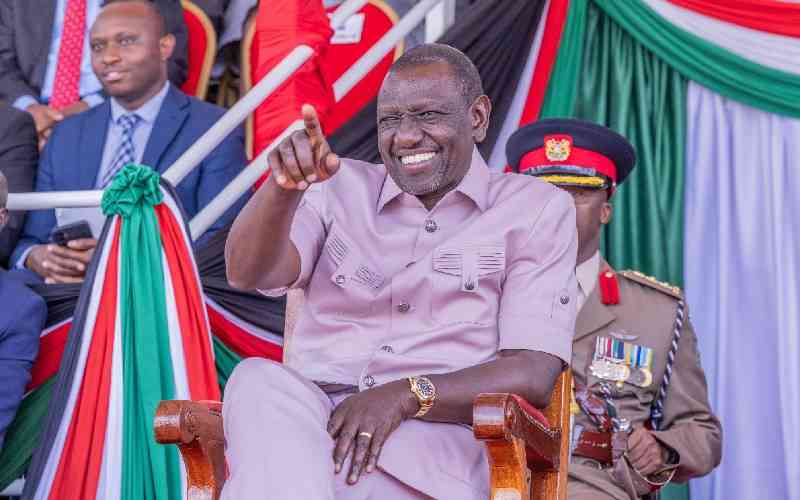Pundits believe the 21st century is Africa’s; that the growing middle class makes Africa the next frontier. I wonder: Does Kenya have a middle class or is what we have a fake middle class? And who exactly falls into this group? While some experts define the middle class by income, others define it by lifestyle. Still others say it’s a state of mind.
We have just emerged from a very divisive election in which tribal inclinations took centre stage. It is in politics that we appreciate the lack of a class that is defined less by tribe and more by income and lifestyle. Kenya’s politics is played largely by an opportunistic political class propped up by an acquiescent lower class.
The middle class are mere spectators. Truly speaking, Kenya is at the mercy of the tribe. Any form of decision-making is made with consideration of the tribe. Be it voting, policy analysis, budgeting, referendum, Government appointments among others. Everything is viewed using tribal lenses. The average middle class Kenyan makes an open disavowal of the tribe. They mingle freely with members of other tribes and even intermarry.
Yet it is quite disheartening that the most compelling logic across the Kenyan society today is our tribe; a problem a vibrant middle class would have solved. You see, this lack of a middle class is in the end a barrier to Kenya’s competitiveness as an investment destination and that is why there are jitters every election time. When I talk to many educated Kenyans, young and old, everyone knows this is bad but no one offers any solution; as in walk away from the tribe.
Menacing grip
The menacing grip of the tribe is astonishing.You have never come across a debilitating herd mentality like that which exists in our society. When we engage in conversation with people from the corporate world, the academics to the man on the street, Kenyans know what they don’t want and what they want, but are collectively imprisoned by tribe.
The truth of the matter is that Kenyans have hit middle-level incomes but they still don’t have middle class behaviour or lifestyle due to the other more important variables. For instance, Rwanda has an elite class, which is middle class much more due to behaviour than incomes.
Beating a wife among the middle class households in Rwanda is unheard of and can land you in jail but in Kenya - from Karen, to Runda, to Lavington, to Langata - wife-battering is still commonplace. Did you know that the Arab Spring in 2011 was based on the premise that any regime that has killed the middle class collapses? Egypt is a case in point.
So tell me; why hasn’t Kenya’s political establishment collapsed if that logic holds true? The truth is there is no such thing as a middle class constituency. In fact, the clearest way to demonstrate that Kenya still doesn’t have a middle is the 2017 elections. I watched the campaign to the end and never did I see any effort by any political coalition to woo the middle class.
There was no political messaging to targeting the so-called middle class. Why? The politicians know it doesn’t exist. Period. The fact is; middle class is not yet a group to reach out to in political campaigns. Even in the making of national budgets, do we hear anything for the middle class?
Opposition bashing
Check again, it is the politicians who comment on the budget with those from the Government applauding and those from Opposition bashing it. While that is happening, Kenyans from the Opposition strongholds will side with the Opposition while those from Government’s strongholds will applaud the State on the budget. Unfortunately, these strongholds are defined by tribal affiliations.
So what are the implications of lack of middle class or class in Kenya? It means we are stuck with a political architecture that only works to perpetuate the elite. I think we actually have a middle class. Yet despite that it is generally dormant and unsure of what it wants to do with itself. A lot of them think spending the weekends shopping in the malls, enjoying exotic food and fine wine in posh restaurants and a weekend out at the coastal beaches is all that there is to do with life.
As long as their children can go to top private schools and get treated in private hospitals perhaps in Europe, life is good. Yet that is a fallacy because most of them don’t even own the houses they live in. Kenya’s Gross National Income (GNI) per capita has hit $1,160. According to the World Bank, a country is classified as middle income if its GNI per capita – a nation’s GDP plus net income received from overseas – surpasses $1,036.
Stay informed. Subscribe to our newsletter
These statistics provide a better understanding of the economy but, in themselves, do not change people’s lifestyles and hence can’t make them middle class. Moreover, the consumerism that makes Telcos, Saccos, MFIs, banks sell to Kenyans quick loans instead of savings and investments has created this fallacy. Actually, there are more incentives for borrowing than saving. I have never seen anything like it before. Think again if you thought of yourself as a Kenyan middle class.
Dr Ogola is Senior Lecturer- Strategy and Competitiveness, Strathmore Business School [email protected]
 The Standard Group Plc is a
multi-media organization with investments in media platforms spanning newspaper
print operations, television, radio broadcasting, digital and online services. The
Standard Group is recognized as a leading multi-media house in Kenya with a key
influence in matters of national and international interest.
The Standard Group Plc is a
multi-media organization with investments in media platforms spanning newspaper
print operations, television, radio broadcasting, digital and online services. The
Standard Group is recognized as a leading multi-media house in Kenya with a key
influence in matters of national and international interest.
 The Standard Group Plc is a
multi-media organization with investments in media platforms spanning newspaper
print operations, television, radio broadcasting, digital and online services. The
Standard Group is recognized as a leading multi-media house in Kenya with a key
influence in matters of national and international interest.
The Standard Group Plc is a
multi-media organization with investments in media platforms spanning newspaper
print operations, television, radio broadcasting, digital and online services. The
Standard Group is recognized as a leading multi-media house in Kenya with a key
influence in matters of national and international interest.








